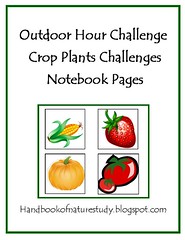
For this week's challenge we will be straying from the Handbook of Nature Study just a little. I wanted to give the opportunity for our children to observe the seed germination process first hand as we work our way through these challenges. The Germinator project we did last year as part of Challenge #19, but it is so much fun that I am going to include it with the bean challenge.
I am going to give you a link to a Google book that explains the vocabulary in seed germination.
Practical Nature Study and Elementary Agriculture, by John M. Coulter, written in 1909.
(http://books.google.com/books?id=ZJtJAAAAIAAJ&printsec=frontcover)
Scroll down to page 249, read the first two paragraphs. I love the simplicity of this explanation and I think we will sketch this out in our nature journals with labels.
Outdoor Hour Challenge
Crop Plants #2
Beans/Seed Germination
Inside Preparation Work
1. Read in the Handbook of Nature Study pages 458-459-Seed Germination. You can germinate your own beans to observe by choosing one of the following activities. I consider both of these projects to be "beginners" projects so don't hesitate to give them both a try!

A. The Germinator
http://pbskids.org/zoom/activities/sci/germinator.html
(This project was a part of Outdoor Hour Challenge #19.)
This is an easy project that can be accomplished with just a little effort. Children of all ages delight in watching their very own baby bean plants emerge from seeds.
B. Egg Shell Seed Starters
http://www.instructables.com/id/Eggshell_Seed_Starters/
(This project is illustrated in the Handbook of Nature Study on page 459.)

Outdoor Time
3. For this challenge, spend 10-15 minutes outdoors in your own backyard. If you have some green bean seeds, plant some in your garden or in a big pot. You may wish to soak your beans overnight before you plant them.

Plant your beans according to the package instructions. If you have already planted some beans, make sure to observe their growth. My seed packet says that it takes 52 days until harvest so you may still even have time to reap some beans from your plant this season. If not, this is still a great way to learn about seed germination and you can plan on getting some beans in the ground next spring. You will be ready with your seeds and your additional knowledge.
Follow-Up Activity
4. Allow time for discussion and a nature journal entry after your outdoor time. Sketching your beans or any other seeds before you plant them and then as they progress and grow can be an on-going project in your nature journal. (If you have the Crop Plants notebook pages, you will find a page to record your seed germination.)

5. You can use the questions on page 459 to help your child narrate what happens with your seeds as they germinate.
Here are a few questions to get you started:
Which comes out of the seed first, the root or the shoot and leaves?
Which way does the root grow up or down?
How do the seed leaves get out of the seed coat, or shell?
Optional Activity:
This week you can purchase some fresh green beans to observe and to taste as a family. Have your children help you wash and prepare the beans for a delicious treat.

New for this series of challenges are custom made notebook pages for each crop plant we will study. I have designed simple to use pages that will complement each challenge and will be an easy way to start a nature journal. Each of the eight notebook pages is in full color, but they are just as great in black and white. These notebook pages can be purchased for $2.50.
As usual, you can complete the challenges without the notebook pages or you can use freebies from the top tab of my blog.
